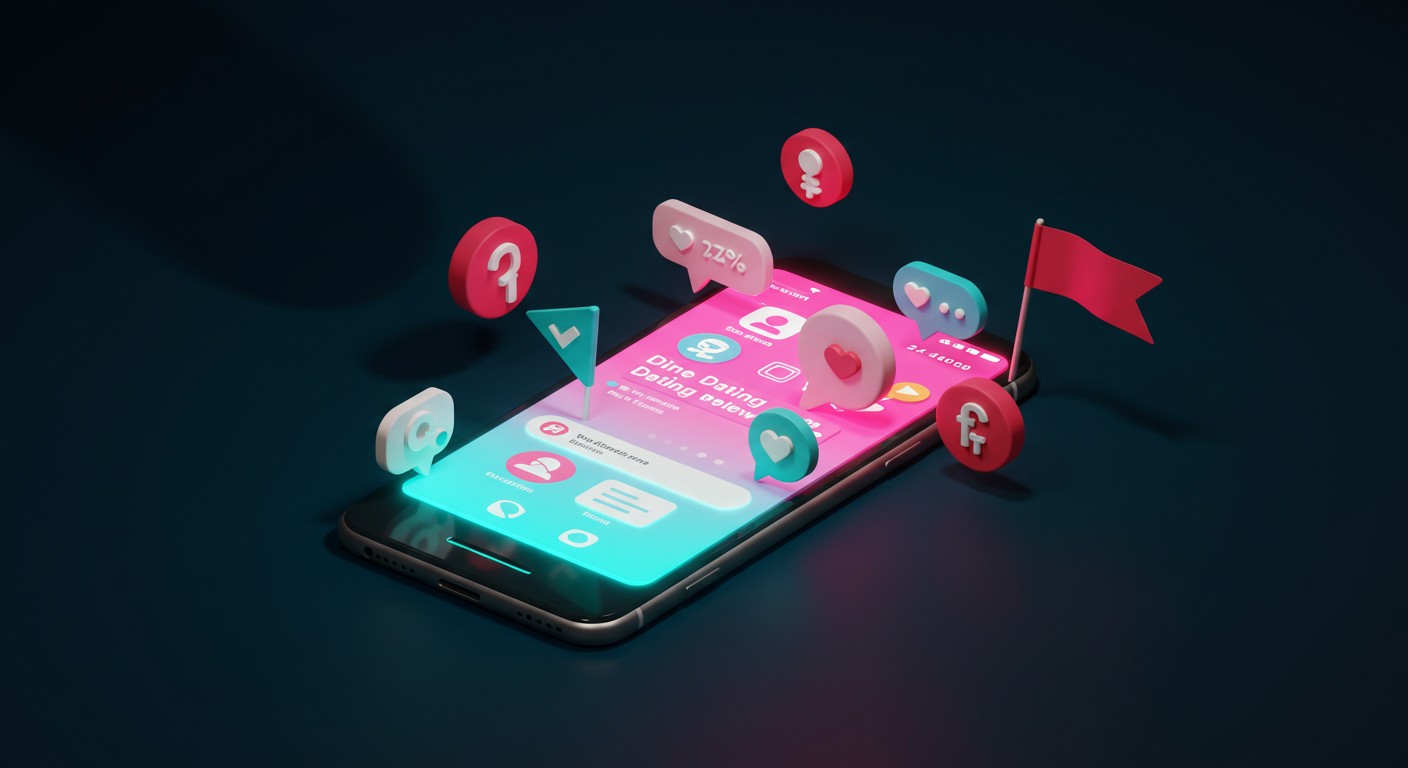Have you ever wished for a crystal ball before a first date, something to warn you about the guy you’re about to meet? Maybe a heads-up about whether he’s a charmer with a hidden agenda or just bad at texting back? Enter the Tea App, a women-only platform that’s exploded onto the dating scene, promising to arm women with the knowledge to navigate the wild west of online romance. But here’s the kicker: while it’s marketed as a safety tool, it’s sparked a firestorm of debate, with some calling it a revolutionary step for women’s empowerment and others labeling it a digital witch hunt. So, what’s the real story behind this viral sensation?
I’ve spent hours diving into the buzz around this app, and let me tell you, it’s a fascinating mix of good intentions, messy execution, and a whole lot of drama. The Tea App, launched in 2023, lets women anonymously share experiences about men they’ve dated, from glowing praise to scathing warnings. It’s like a private group chat for the entire dating world, but with stakes that feel sky-high. In this article, we’ll unpack what the app is, why it’s causing such a stir, and whether it’s truly a game-changer or just fueling a toxic environment.
What Is the Tea App, and Why Is It Everywhere?
The Tea App, often dubbed the “Yelp for dating,” was created with a noble goal: to make online dating safer for women. Founded by a tech entrepreneur inspired by his mother’s rough experiences with catfishing and shady characters, the app aims to give women a space to vet potential dates. Users must verify their identity with a selfie, ensuring only women can join, and the platform offers tools like background checks and reverse image searches to spot red flags like hidden marriages or criminal records.
Once inside, women can post anonymous reviews, share stories, and assign “green flags” for great guys or “red flags” for those to avoid. Sounds empowering, right? It’s no wonder the app skyrocketed to the top of the App Store charts in 2025, with millions of downloads in just weeks. But as I dug deeper, I found that the reality isn’t so black-and-white. The app’s anonymity and women-only setup have created a space where raw honesty can sometimes spiral into something far less constructive.
It’s like a digital whisper network, giving women the power to protect each other from bad actors in the dating world.
– Relationship blogger
The Appeal: Why Women Are Flocking to Tea
Let’s be real: dating in 2025 can feel like navigating a minefield. From ghosting to lovebombing, women face a slew of challenges that make dating safety a top priority. According to recent studies, over half of women feel unsafe on dating apps, citing risks like harassment or worse. The Tea App taps into this very real fear, offering a space where women can share intel and avoid potential disasters.
Imagine this: you’re about to meet a guy for coffee, but a quick search on Tea reveals he’s been flagged for lying about his relationship status. Or maybe another woman shares a story about a date who turned aggressive. These insights can be lifesavers, and users rave about the sense of community the app fosters. One user shared how she avoided a dangerous situation after learning about a man’s history of coercive behavior, a story that resonated with me as a reminder of why such platforms are born.
- Access to crowdsourced knowledge about potential dates
- Tools like background checks to verify identities
- A women-only space that feels like a safe haven
But here’s where my enthusiasm wanes a bit. While the app’s mission is rooted in protection, the execution sometimes feels like it’s veering off course. What happens when a platform designed for safety becomes a breeding ground for something else entirely?
The Dark Side: When Empowerment Turns Toxic
I’ll admit, I was initially intrigued by the idea of a platform where women could share unfiltered truths. But after exploring user experiences and online discussions, I started to see cracks in the facade. The Tea App’s anonymity, while protective, also opens the door to unverified claims. Women can post about men without proof, and since men can’t access the app, there’s no way for them to respond or defend themselves. This one-sided setup raises some serious ethical questions.
Take, for example, a scenario where a woman posts about a guy who ghosted her after one date. Harmless enough, maybe. But what if she exaggerates, claiming he’s a “serial manipulator” with no evidence? I’ve seen posts on social media describing men being labeled with wild accusations—like being a “trafficker” or “drug addict”—that turned out to be baseless. These kinds of claims can ruin reputations, especially when they spread beyond the app, which, let’s face it, happens despite the “no screenshots” rule.
Anonymity can be a shield, but it can also be a sword, cutting down anyone in its path without accountability.
– Dating coach
The app’s rules supposedly ban defamatory content, but enforcement seems spotty at best. I can’t help but wonder: is this really about safety, or is it sometimes just a digital burn book? The line between protecting women and enabling vindictive gossip feels blurry, and that’s where the Tea App starts to lose its shine.
The Privacy Problem: A Breach of Trust
If the potential for toxic gossip wasn’t enough, the Tea App has faced a much bigger issue: security breaches. In mid-2025, reports surfaced of a massive data leak, exposing thousands of user selfies, IDs, and private messages. This wasn’t just a minor glitch—sensitive details about women’s dating experiences, including discussions about abuse, were splashed across the internet, landing on platforms known for toxicity.
For an app that promised anonymity and safety, this was a gut punch. Women who joined to protect themselves suddenly found their personal information vulnerable. The company scrambled to address the issue, but the damage was done. It’s hard to trust a platform that can’t keep your secrets safe, and this incident only fueled the app’s critics, who argue it’s doing more harm than good.
| Feature | Intended Benefit | Potential Risk |
| Anonymity | Protects user identity | Encourages unverified claims |
| Background Checks | Ensures safer dating | Data mishandling risks |
| Women-Only Access | Creates safe space | Excludes men from responding |
The breach made me rethink the app’s core promise. If you’re signing up to feel secure, only to have your private messages leaked, is it worth the risk? It’s a question every user needs to ask themselves.
The Bigger Picture: What Tea Says About Modern Dating
The Tea App didn’t create the problems in modern dating—it just shines a spotlight on them. We’re living in an era of defensive dating, where trust is scarce, and everyone’s on guard. Women are exhausted by the risks of online dating, from catfishing to outright danger, while men are increasingly wary of being misjudged or misrepresented. The app’s rise reflects a deeper issue: a breakdown in how we connect and communicate.
Relationship experts suggest that apps like Tea fill a gap left by traditional dating platforms, which often prioritize swipes over safety. But there’s a catch. Relying on anonymous reviews can erode personal intuition, making users feel like they need a crowd’s approval before trusting their gut. I’ve always believed that dating should be about curiosity and connection, not a pre-screened checklist of warnings.
Turning dating into a crowdsourced investigation might feel empowering, but it risks replacing genuine connection with suspicion.
– Relationship therapist
Perhaps the most intriguing aspect of Tea is what it reveals about our culture. It’s not just about one app—it’s about a dating landscape where fear and mistrust are the default. The app’s popularity shows how desperate women are for tools to feel safe, but its controversies highlight the dangers of letting anonymity run wild.
Can Tea Be Fixed? Striking a Balance
So, is the Tea App doomed to be a toxic mess, or can it live up to its potential? I think there’s a middle ground, but it’s going to take some serious work. For starters, better moderation could curb the app’s descent into gossip territory. Clear guidelines, enforced consistently, would help ensure posts stay focused on safety rather than settling personal scores.
Then there’s the privacy issue. The app needs ironclad security to restore user trust—no ifs, ands, or buts. Beyond that, I wonder if there’s a way to give men a limited ability to respond to claims without compromising the app’s women-only space. It’s a tricky balance, but fairness matters. Nobody wants a platform where accusations, true or false, can linger indefinitely without context.
- Strengthen content moderation to filter out defamatory posts
- Invest in top-tier cybersecurity to prevent breaches
- Explore ways to allow limited, anonymous responses from men
In my view, the app’s heart is in the right place, but its execution needs a serious overhaul. A platform that truly prioritizes women’s safety without devolving into chaos could be a game-changer, but it’s got to walk the line between empowerment and accountability.
Should You Use the Tea App?
Here’s the million-dollar question: is the Tea App worth your time? If you’re a woman navigating the dating world, the appeal is undeniable. The ability to check for red flags and connect with a community of women feels like a lifeline in a world where online dating can be daunting. But you’ve got to weigh the risks—both to your privacy and to the potential for getting caught up in a toxic echo chamber.
My advice? Use it cautiously. Stick to sharing or seeking factual, safety-related info, and avoid the temptation to dive into the gossip. And always, always trust your own instincts first. No app, no matter how popular, can replace your ability to read a situation or a person.
Dating Safety Checklist: - Meet in public places - Share plans with a friend - Trust your gut instincts - Verify identities lightly (social media, quick searches)
If you’re a guy wondering how to navigate this new reality, my heart goes out to you. The idea of being anonymously reviewed with no recourse is unsettling, to say the least. Focus on being transparent, respectful, and consistent in your dating life—it’s the best defense against ending up on the wrong side of a review.
Final Thoughts: A Mirror to Our Dating Culture
The Tea App is more than just an app—it’s a snapshot of where we’re at in 2025. It reflects the fear, frustration, and distrust that define modern dating, but it also hints at a desire for something better. Maybe the answer isn’t more apps or more reviews, but a return to building connections the old-fashioned way: with curiosity, respect, and a willingness to take a chance.
I can’t help but feel a bit torn. Part of me cheers for a platform that gives women a voice in a dating world that often feels stacked against them. But another part cringes at the potential for misuse and the harm it can cause. The Tea App isn’t going anywhere soon, but its legacy will depend on whether it can evolve into something that truly serves its users without fueling division.
So, what do you think? Is Tea a bold step toward safer dating, or a slippery slope into toxicity? I’d love to hear your take—because in the end, dating is about real people, not just apps and algorithms.












